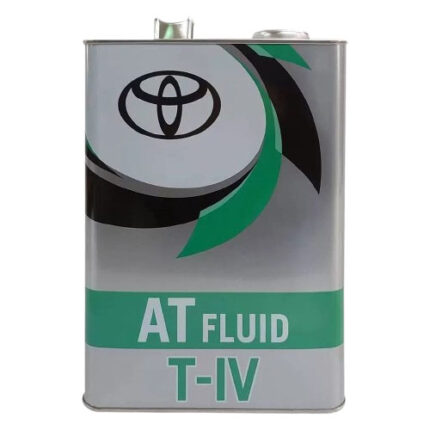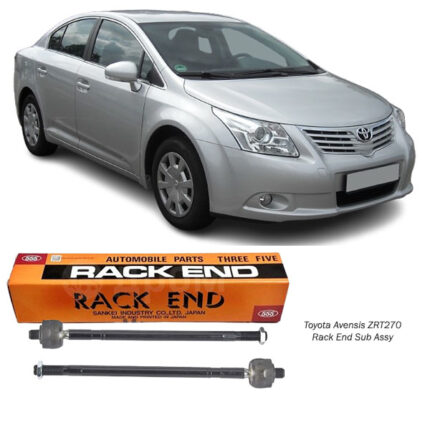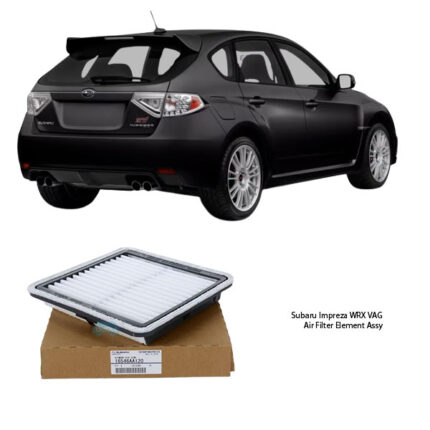Get Subaru Impreza WRX VAG Air Filter Element Assy 16546-AA120 in Kenya
The Air Filter Element Assembly is a vital component in the vehicle’s air intake system. Its primary role is to ensure that clean, filtered air reaches the engine’s combustion chamber. By trapping dust, dirt, debris, pollen, and other contaminants, the air filter protects the engine from damage while promoting optimal air-fuel mixture for efficient combustion.
Function of the Air Filter Element Assembly
The air filter is typically located within an air box or housing and acts as the gatekeeper for all air entering the engine. Combustion engines rely on a precise mixture of air and fuel to operate effectively. If the incoming air contains pollutants, it can lead to a range of engine problems, including poor performance, increased emissions, and premature wear of internal parts.
An air filter assembly is designed with pleated paper or synthetic material to maximize surface area, allowing it to trap more particles while maintaining smooth airflow. A well-functioning air filter helps:
-
Maintain optimal engine performance
-
Improve fuel efficiency
-
Reduce emissions
-
Extend the life of engine components like spark plugs, pistons, and cylinder walls
Advantages of a High-Quality Air Filter Element Assembly
A premium air filter delivers multiple advantages beyond just basic filtration:
-
Enhanced Engine Protection
It effectively prevents abrasive particles from entering the engine, reducing the risk of scoring or damage to internal parts. -
Improved Fuel Efficiency
With unrestricted airflow and clean oxygen supply, combustion becomes more efficient, translating to better fuel economy. -
Longer Engine Life
Continuous protection from contaminants means fewer wear-related issues over time. -
Stable Acceleration and Performance
A clean air filter ensures a steady airflow, which helps maintain responsive throttle and consistent power output. -
Reduced Maintenance Costs
By minimizing engine strain and dirt accumulation, a high-quality air filter can reduce the frequency and cost of engine repairs.
Risks and Disadvantages of a Poor or Worn-Out Air Filter
Using a low-quality or clogged air filter can introduce a host of problems:
-
Engine Contamination
Ineffective filtration allows dust and dirt to enter the engine, potentially leading to internal damage. -
Decreased Engine Power
Restricted airflow caused by a clogged filter affects combustion, resulting in sluggish acceleration and poor overall performance. -
Increased Fuel Consumption
When the engine doesn’t receive enough air, it compensates by using more fuel, reducing efficiency. -
Excessive Emissions
Incomplete combustion due to an inadequate air supply can lead to higher levels of pollutants being emitted from the exhaust. -
Engine Misfires and Starting Issues
Poor air quality can disrupt the air-fuel ratio, causing misfires, rough idling, or difficulty starting the engine.
Signs of a Worn-Out Air Filter Element Assembly
It’s essential to recognize when an air filter is no longer performing effectively. Some common signs include:
-
Reduced Acceleration
Slower throttle response, especially during uphill driving or sudden acceleration. -
Increased Fuel Consumption
A noticeable drop in fuel economy can signal that the engine is overcompensating due to restricted airflow. -
Unusual Engine Noises
Whistling or coughing sounds from the engine bay may indicate airflow restriction. -
Black Smoke from Exhaust
A clogged air filter may cause an overly rich fuel mixture, leading to visible exhaust smoke. -
Check Engine Light
In some systems, a faulty air-to-fuel ratio caused by air filter problems may trigger a warning light. -
Visual Inspection
When removed, a clean air filter will appear white or off-white. A dirty one will look dark, dusty, and possibly oily.
How to Replace the Air Filter Element Assembly
Replacing an air filter is a straightforward task and typically takes only a few minutes. Follow these general steps:
-
Locate the Air Filter Housing
The air filter is housed in a plastic or metal box, usually secured with clips, screws, or clamps. -
Open the Housing
Carefully remove the cover, being mindful of any attached hoses or sensors. -
Remove the Old Air Filter
Take out the used air filter. Note its orientation for proper placement of the new one. -
Inspect the Housing
Wipe down the inside of the housing to remove any accumulated dirt or debris. -
Install the New Filter
Place the new air filter in the same orientation as the old one. Ensure it fits snugly and evenly. -
Secure the Housing
Close the cover and fasten all screws, clips, or latches securely. -
Final Check
Confirm that everything is sealed properly to prevent unfiltered air from entering the engine.
Maintenance Tips for Air Filter Element Assemblies
-
Follow Manufacturer Recommendations
Always refer to the recommended replacement interval. Most filters should be replaced every 10,000 to 15,000 kilometers, but it varies depending on the environment and driving conditions. -
Inspect Periodically
Even if replacement isn’t yet due, inspect the air filter regularly, especially after off-road or dusty drives. -
Avoid Over-Cleaning
Some air filters are reusable and can be cleaned, but most standard filters are disposable. Never attempt to wash a non-reusable filter. -
Upgrade When Necessary
In high-dust environments or performance setups, consider using high-efficiency or heavy-duty air filters. -
Ensure Proper Fit
Using the wrong size or poorly fitting air filter can allow unfiltered air into the engine, negating its purpose. -
Combine with Routine Maintenance
Replace the air filter during routine services to ensure consistent engine protection and performance.
Follow us on Facebook for more parts.




